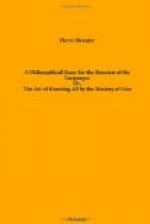For this reason altho I consider every Language in its greatest perfection, yet for clearing its originall in rendring this sequel of words more open and palpable I have been oblidg’d to make numerous reflections upon the older forms of speech as well as Orthographie, by which a better discovery may be made of all the varieties that occure in pronunciation, as also of the severall medlies and Gibrish of the Provinces of Each Empire that speak the same Language, but most of them in a singular fashion.
So that it is most certain that that Language which is most quaint and polite is very often the lesse pure and most debaucht, if we make an aequall judgment from its originall which is the most unquestionable rule: Upon which account the dialects of Province, Gascogne, Languedoc, and that which is known by the name of the Antient Gauls is infinitely lesse alter’d and distanc’t from its original, then the Languages of the Court and Nobility, who take a pleasure in receding from the Latin: Those of Lombardy and Naples are for the most part lesse corrupt than these of Siena and Florence; Altho the Spaniards have a saying among them, that the Catalonian and that of Arragon is commonly more pure then the Castilian that is more Pompous. And not to spare the French more then the Spaniard, if they have reason to boast their Language to be the most refin’d and Polite of the world, yet their Neighbours might justly returne upon them, that of all the Dialects of the Latin, there is none more degenerate than theirs, forasmuch as its quaintness ariseth from its sweetnesse, so that it is not attainable without a strange descent from its principle. Thus le Capo of the Italians, le Cabo, of the Spaniards, le Cap, of the old French and le Kef of Picardy are all variously alterd from Caput of the Latins, but none so much as le Chef of the French, which notwithstanding claims the same Originall.




